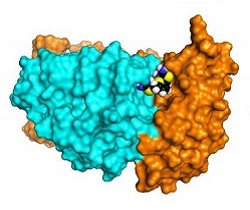 |
| A new compound (the multicolored molecule) may be able to stabilize the brain's retromer protein complex (the blue and orange structures), which is linked to amyloid-β formation in Alzheimer's disease.--Courtesy of Nature Chemical Biology and lab of Scott A. Small, MD/Columbia University Medical Center |
A team of investigators has identified a new class of compounds that could work in a specific protein complex in the brain to provide a safe route toward reversing the devastating symptoms of Alzheimer's.
Known as the retromer protein complex, these proteins are found in reduced levels in the brains of Alzheimer's patients. Retromers play a crucial role in neurons, steering amyloid precursor protein away from a region of the cell where these proteins clump together to create amyloid β. Amyloid β has long been implicated in the development of Alzheimer's disease.
Using computer-based virtual screening, researchers from Columbia University Medical Center, Weill Cornell Medical College and Brandeis University have cataloged a new class of compounds, dubbed pharmacologic chaperones, that can boost retromer levels and decrease amyloid-β levels in cultured hippocampal neurons, without signs of cell toxicity. Their findings were published April 20 in the journal Nature Chemical Biology.
"Our findings identify a novel class of pharmacologic agents that are designed to treat neurologic disease by targeting a defect in cell biology, rather than a defect in molecular biology," said Dr. Scott Small, director of the Alzheimer's Disease Research Center at Columbia University Medical Center, and a senior author of the paper, in a statement. "This approach may prove to be safer and more effective than conventional treatments for neurologic disease, which typically target single proteins."
Small and his colleagues were the first to show in 2005 that the brains of Alzheimer's patients are deficient in the protein retromer. For the new study, Small and his team identified 100 potential retromer-stabilizing candidates, of which 24 seemed promising. When the compounds were tested in the retromer complex under heat stress, one compound, called R55, was found to significantly increase the stability of retromer.
The compound significantly increased retromer levels and decreased amyloid-β levels in cultured neurons taken from healthy mice and from a mouse model of Alzheimer's. In lab tests, the compound was found to be relatively nontoxic. The researchers are now testing the effects of R55 in the actual mouse model.
- read the press release
- see the study abstract